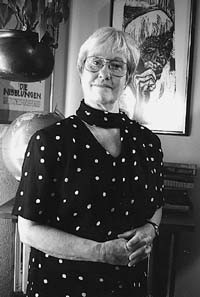Helena Carlson honored

“What is so admirable about Dr. Helena Carlson’s work is that it often shines a light in areas where there has been darkness–not only the darkness of the unknown, but of the rejected or ignored,” says Christina Maslach, professor of psychology at the University of California at Berkeley.
Carlson, professor emerita of psychology, has conducted research on community policing, women, racial and sexual minorities, women and homelessness, street youth, the psychological effects of unemployment, sexual harassment, acquaintance rape, the nomadic Irish tinkers and policing in Northern Ireland.
She has published extensively, made numerous conference presentations and delivered many invited lectures.
Arnold Kahn, professor of psychology at James Madison University, praises Carlson’s work as ground breaking.
“A unique aspect of Dr. Carlson’s work is its cross-cultural focus,” Maslach notes. “For years, she has conducted studies in both the United States and Ireland and has published in both American and Irish journals.”
“The exciting period of social change, which impacted the lives of women and different minorities, led me into cross-cultural research on gender, sexual orientation and psychological health in Ireland and the United States,” Carlson explains.
Those social changes also impacted her life. Carlson was the first woman to chair the psychology department in 1983. She went on to chair the department twice.
Carlson also chaired the faculty task force that designed the sexual harassment policy for the College in 1984. Later, she worked with faculty at Trinity College in Dublin, Queen’s University in Belfast and other universities in Ireland to help them establish procedures for dealing with sexual harassment.
In 1999, the Independent Commission on Policing in Northern Ireland recommended all the reforms that Carlson suggested in her article on policing in Northern Ireland. She based her advice upon an extensive study of community policing in the United States and on an examination of policing in Belfast.
Carlson particularly enjoys working with students to create research presentations and papers of regional and national scope.
“It’s rare for undergraduates to present their own research at psychological conferences, and Lewis & Clark fosters that experience,” she says. “It makes me feel proud to see my students—undergraduates—standing up at national or regional conferences before a room full of PhD’s.”
For example, Kathy Ivers ’89 and Carlson presented and published two papers on female street youth.
“Now an attorney living in New York, Kathy has become an advocate for children,” Carlson notes. “While working at a corporate law firm, she helped to file a class-action suit against the city of New York on behalf of abused children.”
Other students, who participated in one of the four study programs to Ireland that Carlson directed, developed research papers on Irish social policy and social issues. They, too, often presented their papers at American psychological conferences.
“I incorporated research into all my classes so that students learned how research is designed, how psychological measures are selected, how survey questions are formulated, how theories are tested, how research literature is reviewed and what the ethical issues are,” Carlson explains.
Media in the United States, Ireland, Canada and Britain often call upon her expertise, and she welcomes the opportunity to widely distribute her findings.
“I believe that research knowledge should be distributed not only through scholarly journals but also to the public through the media,” Carlson says.
Her work has been reported in The New York Times, The Boston Globe, The Irish Times, Los Angeles Times, The Belfast Telegraph and The Monitor of the American Psychological Association. She also appears frequently on television, including the “Jim Lehrer NewsHour.”
“It has been exciting work,” Carlson says, “and I hope that I have made a contribution in creating a more tolerant and caring society.”
Carlson holds a doctorate and master’s degree from the University of California at Riverside and a bachelor’s degree (summa cum laude) from California State University at Long Beach.
More L&C Magazine Stories
Lewis & Clark Magazine is located in McAfee on the Undergraduate Campus.
MSC: 19
email magazine@lclark.edu
voice 503-768-7970
fax 503-768-7969
The L&C Magazine staff welcomes letters and emails from readers about topics covered in the magazine. Correspondence must include your name and location and may be edited.
Lewis & Clark Magazine
Lewis & Clark
615 S. Palatine Hill Road MSC 19
Portland OR 97219

